Commentary - (2024) Volume 8, Issue 4
The Impact of Ultra-Processed Foods on Population Health
Zakari AD*
Department of Microbiology, Kogi State University, Nigeria
*Correspondence:
Zakari AD,
Department of Microbiology, Kogi State University,
Nigeria,
Email:
Received: 02-Dec-2024, Manuscript No. ipjfnph-25-22474;
Editor assigned: 04-Dec-2024, Pre QC No. ipjfnph-25-22474 (PQ);
Reviewed: 18-Dec-2024, QC No. ipjfnph-25-22474;
Revised: 23-Dec-2024, Manuscript No. ipjfnph-25-22474 (R);
Published:
30-Dec-2024, DOI: 10.21767/2577-0586.8.4.31
Description
Over the past few decades, Ultra-Processed Foods (UPFs) have
become a dominant part of the global diet. These foodsâ??often
high in refined sugars, unhealthy fats, artificial additives, and
sodiumâ??are widely consumed due to their convenience and
affordability. However, the growing reliance on UPFs has raised
significant public health concerns. Numerous studies link their
consumption to obesity, metabolic disorders, cardiovascular
diseases, and mental health issues. This article explores the
impact of UPFs on population health and the urgent need for
dietary interventions. Ultra-processed foods are industrially
manufactured products made from refined ingredients and
synthetic additives. Unlike minimally processed or whole foods,
UPFs undergo multiple stages of processing to enhance taste,
texture, and shelf life. Examples include soft drinks, instant
noodles, packaged snacks, processed meats, sugary cereals,
and ready-to-eat meals. These foods often contain little to
no whole food components and are designed to be highly
palatable, leading to overconsumption. UPFs are typically high
in calories but low in essential nutrients, making them a major
driver of obesity. Their combination of high sugar, unhealthy
fats, and refined carbohydrates leads to excessive calorie
intake and weight gain. Research suggests that individuals who
consume more UPFs tend to eat more overall, as these foods
are engineered to stimulate cravings and reduce satiety.A diet
high in UPFs contributes to insulin resistance, a key factor in
the development of type 2 diabetes. Frequent consumption
of refined sugars and artificial sweeteners causes rapid spikes
in blood sugar levels, straining the bodyâ??s ability to regulate
glucose. Sugary beverages, in particular, have been strongly
linked to an increased risk of diabetes. Many UPFs contain
trans fats, excessive sodium, and artificial preservatives, all of
which increase the risk of heart disease. High sodium intake
contributes to hypertension, a leading cause of stroke and
heart attacks. Meanwhile, trans fats raise LDL (bad cholesterol)
levels while lowering HDL (good cholesterol), further elevating
cardiovascular risks. UPFs lack dietary fiber, which is essential
for maintaining a healthy gut microbiome. The artificial
additives and emulsifiers commonly found in processed foods
can disrupt gut bacteria, leading to chronic inflammation. This
imbalance is associated with digestive disorders, weakened
immunity, and an increased risk of autoimmune diseases.
Emerging research suggests that diets high in UPFs are linked to
poor mental health. Nutrient deficiencies caused by excessive
consumption of processed foods may contribute to depression
and anxiety. Additionally, artificial additives and preservatives
have been found to affect brain function and mood stability.
The increasing consumption of UPFs is a growing public health
concern worldwide. These foods are often more affordable
and accessible than fresh, whole foods, particularly in lowincome
communities. Food marketing strategies aggressively
promote UPFs, making them the preferred choice for many
individuals. As a result, rates of obesity, diabetes, and other
non-communicable diseases are rising globally. Public health
campaigns should focus on educating consumers about the
risks of UPFs and the benefits of whole, minimally processed
foods. Schools, workplaces, and community programs should
promote healthier dietary choices. Ultra-processed foods have
become a staple in modern diets, but their long-term health
consequences cannot be ignored. From obesity and diabetes
to heart disease and mental health issues, the evidence
against UPFs is overwhelming. Addressing this public health
crisis requires a multi-faceted approach involving government
policies, nutrition education, and individual lifestyle changes.
By prioritizing whole, minimally processed foods, societies can
work toward better health outcomes for future generations.
Acknowledgement
None.
Conflict Of Interest
The author declares there is no conflict of interest in publishing
this article.
Citation: Zakari AD (2024) The Impact of Ultra-Processed Foods on Population Health. J Food Nutr Popul Health. 8:31.
Copyright: © 2024 Zakari AD. This is an open-access article distributed under the terms of the Creative Commons Attribution License, which permits unrestricted use, distribution, and reproduction in any medium, provided the original author and source are credited.

